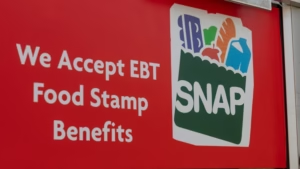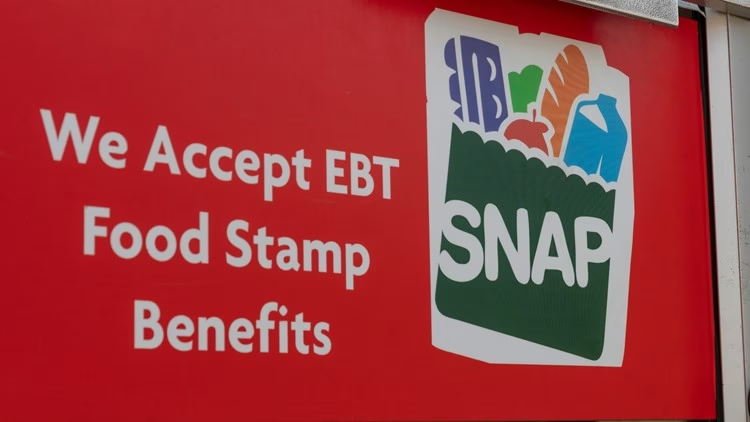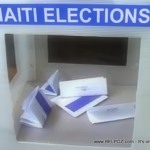The Trump administration has revived one of the most contentious issues in U.S. immigration policy: whether immigrants who use certain lawful public assistance programs can be denied a green card.
A draft regulation submitted by the Department of Homeland Security (DHS) to the Federal Register seeks to repeal the 2022 rule adopted under Joe Biden and to adopt a far more discretionary approach to determining who may be deemed a “public charge.”
A draft regulation submitted by the Department of Homeland Security (DHS) to the Federal Register seeks to repeal the 2022 rule adopted under Joe Biden and to adopt a far more discretionary approach to determining who may be deemed a “public charge.”
Newsweek reports the draft regulation, titled “Public Charge Ground of Inadmissibility,” will be published on November 19. This regulation would allow broader criteria for assessing if a foreign national is likely—now or in the future—to depend on public assistance.
The rule would affect applicants for permanent residency and, potentially, some visa applicants as well.
The rule would affect applicants for permanent residency and, potentially, some visa applicants as well.
What the Biden Rule Changed
The concept of a “public charge” has been embedded in the Immigration and Nationality Act for decades, allowing the government to declare an immigrant “inadmissible” if deemed likely to become primarily dependent on public support.
In 2019, during his first term, Donald Trump expanded this definition to include a wide range of non-cash benefits, including Medicaid, SNAP (food assistance), and federal housing aid.
In 2019, during his first term, Donald Trump expanded this definition to include a wide range of non-cash benefits, including Medicaid, SNAP (food assistance), and federal housing aid.
The 2019 approach produced a well-documented “chilling effect.” Immigrant families, including some with U.S. citizens, avoided medical care or food assistance. They feared these actions might hurt their immigration prospects. Facing legal challenges and the COVID-19 pandemic, the Biden administration stopped enforcing the 2019 rule in 2021. It formally replaced the rule the following year.
The 2022 regulation restricted the public-charge test to cash benefits for income support and to government-funded long-term institutionalization, explicitly excluding most health, nutrition, and housing programs.
The 2022 regulation restricted the public-charge test to cash benefits for income support and to government-funded long-term institutionalization, explicitly excluding most health, nutrition, and housing programs.
What DHS Is Proposing Now
The new proposal goes further than reinstating the 2019 framework. Newsweek and Politico report that DHS will rescind the Biden rule in its entirety. U.S. Citizenship and Immigration Services (USCIS) would later issue internal guidance. Immigration officers would then decide, case by case, who should be considered a public charge.
Axios reports that the administration is considering allowing officers to weigh not only an applicant’s current use of public benefits, but also their medical and economic history—and even that of their family. Certain health conditions or circumstances labeled as “risk factors” could be included. Analysts warn that a highly restrictive policy could result in hundreds of thousands of denials of green cards or visas each year.
The White House defends the shift by focusing on “individual responsibility.” It argues public benefits should not “encourage immigration.” New arrivals, they say, should support themselves without relying on the social safety net. Politico adds that officials mention possible annual savings of billions of dollars if immigrant families leave certain health and nutrition programs.
Advocates Call It a “Wealth Test”
Immigrant-rights organizations denounce the proposal as an overt attempt to reinstate a “wealth test” for accessing permanent residency. In a statement from Washington, National Immigration Law Center President Kica Matos accused the administration of reviving a “regressive” policy designed to sow fear and confusion in immigrant communities. She said the proposal reflects a vision of a country reserved “for those who are white and wealthy,” preventing families from seeking medical care or food assistance without fearing immigration consequences.
The Protecting Immigrant Families coalition, a health and social-service alliance, strongly disagrees. In an online analysis, the group said the proposal “threatens the nation’s health and economic well-being.” It discourages eligible people, including U.S. citizens in mixed-status households, from using legal benefits. The coalition warns the text could count family members’ benefit use and even factors like obesity. It sees this as institutionalizing discrimination.
Housing-rights advocates, including the National Low Income Housing Coalition, add that the debate comes after the longest federal government shutdown and cuts to food, housing, and health aid. In this context, warning families that seeking a housing voucher or Medicaid could hurt their immigration case makes social instability worse for millions.
Exemptions—and Many Uncertainties
DHS stresses that several groups remain exempt from public-charge determinations, including refugees, asylees, trafficking survivors, certain children, and veterans. These exemptions are already established under federal law and are not altered by the proposal. No immediate changes apply to pending cases, as the measure is still a draft and must undergo a public comment period.
Still, practitioners are concerned about the psychological effect. Community health clinics saw drops in immigrant patient visits during the 2019 crackdown, even where the rule did not apply. Experts now fear the same pattern may return, hurting public health and safety-net hospitals that often provide uncompensated care.
Next Steps: A Political and Legal Battle Ahead
The proposal is already listed in the Federal Register’s Public Inspection section and will soon enter the formal “notice-and-comment” stage. During this period, advocates, local officials, professional organizations, and ordinary citizens can submit feedback to DHS, which must address those comments before issuing a final rule that could then face legal challenges in federal court.
For now, immigrant-rights groups plan a dual fight. They are launching a public information campaign to reassure families that nothing will change immediately and urge them not to abandon vital benefits without legal advice. They are also preparing to contest any future final rule in court, if it’s deemed unlawful.
Far from being a technical debate, the public-charge controversy has once again become a political flashpoint shaping how the United States defines its approach to newcomers—whether as an opportunity open only to the financially secure, or as part of a societal project that does not exclude the most vulnerable.
Far from being a technical debate, the public-charge controversy has once again become a political flashpoint shaping how the United States defines its approach to newcomers—whether as an opportunity open only to the financially secure, or as part of a societal project that does not exclude the most vulnerable.








